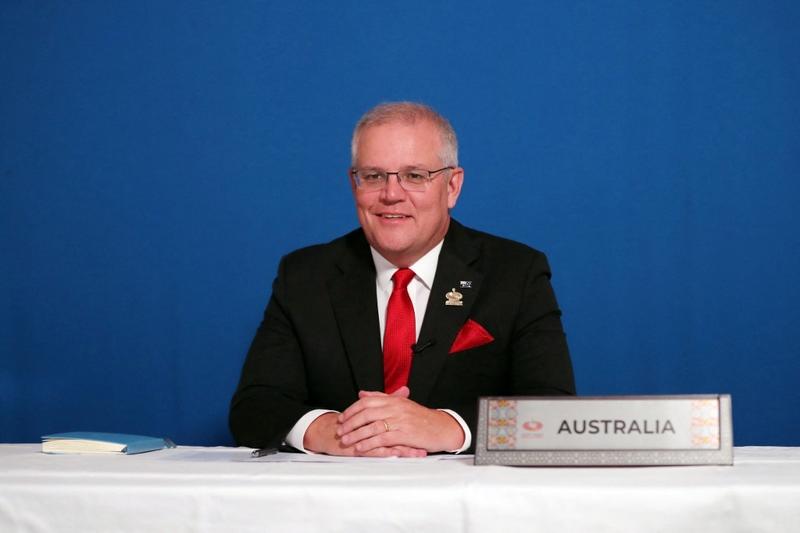 This handout picture taken on November 21, 2020 and released by the Australian Prime Minister's Office shows Australia's Prime Minister Scott Morrison attending an online session of the 2020 Malaysian APEC summit from Canberra along with other APEC leaders from around the world on Nov 21, 2020. (PHOTO / AFP)
This handout picture taken on November 21, 2020 and released by the Australian Prime Minister's Office shows Australia's Prime Minister Scott Morrison attending an online session of the 2020 Malaysian APEC summit from Canberra along with other APEC leaders from around the world on Nov 21, 2020. (PHOTO / AFP)
SYDNEY - Australia will remove exemptions for judges and politicians from sexual harassment laws, Prime Minister Scott Morrison said on Thursday, as his government struggles to contain a backlash over allegations of mistreatment of female lawmakers and staff.
Under broad changes designed to empower complainants in workplace gender-related disputes, employers will be required to take a proactive approach to stopping gender discrimination, while complainants get a longer period of time to lodge their complaint, Morrison said.
Morrison’s handling of the sexual harassment issue has been widely criticised and polls show his personal approval at its lowest level since before the pandemic
Early last year, a report by Australia’s sex discrimination commissioner called for broad changes to workplace laws including removing exemptions for public sector employers and people who hire volunteers.
Morrison said on Thursday he will adopt all 55 of the commissioner’s recommendations which include a blanket ban on workplace gender discrimination, mandatory training of company directors and reporting by listed companies, as well as improved coordination between complaint-handling agencies.
“Sexual harassment is unacceptable,” Morrison told reporters in the capital, Canberra.
READ MORE: Australian police say no criminal misconduct in Vatican funds transfer
“It’s not only immoral and despicable and even criminal, but ... it denies Australians, especially women, not just their personal security but their economic security by not being safe at work.”
Public servants like judges and politicians are currently exempt from complaints about workplace gender discrimination, as are some employers of volunteers, because of a legal loophole which means they are technically not the complainant’s employer.
The government has been battling allegations it has mishandled alleged instances of sexual harassment and assault after a female former staffer of Morrison’s government went public in February with an allegation that she was raped in a ministerial office in 2019.
In March the country’s then attorney general said he was the subject of an unrelated historical rape allegation in 1988, which he has strongly denied.
ALSO READ: Australian cardinal to appeal against sex abuse convictions
Morrison’s handling of the sexual harassment issue has been widely criticised and polls show his personal approval at its lowest level since before the pandemic. A protest outside parliament about gender discrimination and violence drew tens of thousands of people.
Zali Steggall, an independent member of parliament who has advocated for reforms to sexual harassment laws, said the move was “a win for everyone who has been calling on the government to act on sexual harassment, particularly the tens of thousands of people who marched for justice last month”.
Until this year, most polls had suggested that Morrison’s conservative coalition would be returned to office at the next general election, due within a year, after its hardline COVID-19 response all but eradicated the virus in the country.



